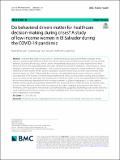Do behavioral drivers matter for healthcare decision-making during crises? A study of low-income women in El Salvador during the COVID-19 pandemic
Author(s)
Lara, Pedro B.; Daga, Giuliana; Kossuth, Lajos; Boo, Florencia L.
Download12889_2024_Article_19039.pdf (1.296Mb)
Publisher with Creative Commons License
Publisher with Creative Commons License
Creative Commons Attribution
Terms of use
Metadata
Show full item recordAbstract
Understanding health-seeking behaviors and their drivers is key for governments to manage health policies. A growing body of research explores the role of cognitive biases and heuristics in health and care-seeking behaviors, but little is known about how a context of heightened anxiety and uncertainty might influence these behavioral drivers. This study analyzes the association between four behavioral predictors—internal locus of control, impatience, optimism bias, and aspirations—and healthcare decisions among low-income women in El Salvador, controlling for other factors. We find positive associations between internal locus of control and preventive health behaviors during the COVID-19 pandemic. For instance, a one standard deviation increase in locus of control is associated with a 10% increase in an index measuring the use of masks, distancing, hand washing, and vaccination. Locus of control was also associated with women’s use of preventive health services (one standard deviation improves the likelihood of having a hypertension test in the last six months by 5.8 percentage points). In a sub-sample of mothers, we find significant relationships between the four behavioral drivers and the decisions the mothers make for their children. However, we find these associations are less robust compared to the decisions they make for themselves. Some associations were stronger during the pandemic, suggesting that feelings of uncertainty and stress could amplify behavioral drivers’ influence on health-related behaviors. This novel finding is relevant for designing policy responses for future shocks.
Date issued
2024-08-06Department
Sloan School of ManagementJournal
BMC Public Health
Publisher
BioMed Central
Citation
Lara, P.B., Daga, G., Kossuth, L. et al. Do behavioral drivers matter for healthcare decision-making during crises? A study of low-income women in El Salvador during the COVID-19 pandemic. BMC Public Health 24, 2122 (2024).
Version: Final published version